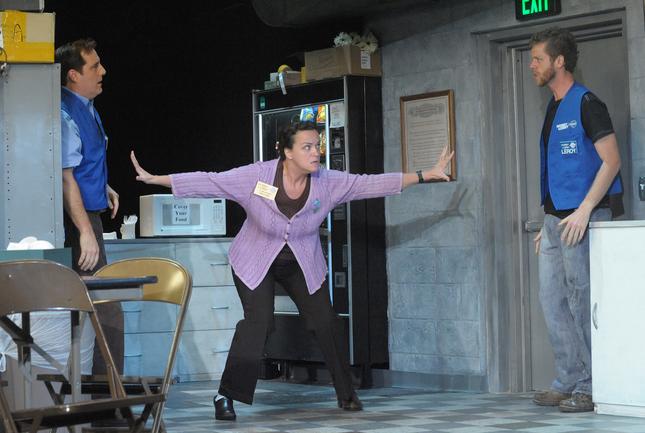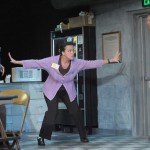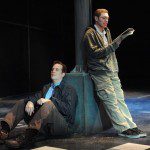‘A Bright New Boise’
By • October 31, 2011 0 1339

For sophisticates, the very hip, cool and urban trendy, there are so many targets in Samuel Hunter’s “A Bright New Boise” (now at the Woolly Mammoth Theatre through Nov 13) to feel smug, snarky and snide about that it could have been a buffet of satire, enough material for a lifetime of Bill Maher monologues.
We gave religious zealotry of the way-out-there-waiting-for-the-Rapture-and-Apocalypse kind. We have corporate dullness and the intellectually empty space of places like Idaho, interrupted only by malls and truck stop traffic. We have a central character so bland that he could disappear easily in a crowd, if only there were crowds to disappear into.
So what does Hunter, a gifted writer and observer, do with this material? He showers it with a deep and imaginative empathy, even love, for the characters he’s created, characters that live in a world very much reflective of our hard-scrabble, economically harrowing times. Hunter makes his play—set in a Hobby Lobby store in Boise, Idaho—a kind of microcosm of the way quite a number of Americans live today—on the edge, hanging by broken nails, embracing the outer limits of apocalyptic faith, trying to find the inner creative flame to ward of the dullness of the days while thinking about the end of days.
At its center is a guy named Will, the new guy in town, who just applied for and got a low-paying job as a clerk in the local Hobby Lobby store, specializing in selling the equipment for arts and crafts things to do—buttons, cloth, paper, paint and none-such. It’s not a big place, and the people we see are Will, vaguely religious, hugely ordinary in his checkered shirt and blue jeans, smart and a little mysterious; Pauline, the branch manager with a tainted heart of gold and a potty mouth; Anna, sensitive, abused, halting, hungry and eager for attention and a little knowledge; Leroy, an in-your-face artistic type who makes obscene T-shirts which he wears to work; and Alexis, a quiet high school kid with secrets and talent.
The characters bump against each other in the employee lounge, sometimes used by Anna to hide out in and read and by Will to work on a blog that’s becoming a novel and has fans on the worldwide web. The story he’s writing is very much like the “Left Behind” novels that were about the end of days and the humans left behind, a very popular Christian series, especially so among Evangelists.
Will—if it weren’t for his secrets and the fact that he’s looking for the son he gave up to be adopted, and for his embrace of the rapture – would pass for the most ordinary, nicest of guys, the kind of guy that for no reason at all goes postal. But Woolly regular Michael Russotto has a gift for making the ordinary seem special—Will is at turns kind, talkative, a good listener, speculative, and haunting as he confronts his past and the pain of never escaping it, erasing it and starting over.
Russotto underplays him to the point that Will is like someone in a video, an old family movie, easy to be around, difficult to know, and when his frustrated, bleeding soul comes up for air, it’s a shattering moment.
Everybody in the cast is affecting—there’s no dissing the characters, the way they live, what they say, especially Kimberly Gilbert, who’s own special gift as an actress has always been to make the sometimes more than mildly weird seem oddly affecting and attractive, and she puts it good use her in a full-bodied portrait of Anna.
Will’s life is a mess, and it’s accentuated by his surroundings, his ruinously fumbling attempt at reunion with his son, the stifling routines and weirdness of the Hobby Lobby. The employee’s lounge is never ever distant from a television monitor which routinely runs a maddeningly dull monotone-voiced in-house video featuring the Hobby Lobby founders handing out tips and news, oddly interrupted occasionally by bursts of videos showing graphic medical procedures, which nobody seems to able to eliminate.
Much of “A Bright New Boise” is sharply observant and funny, without being in any sense an exercise in cheap laughs. Much of it, more importantly, is dark and incredibly sad. You can see how Will’s (and the others’) endless days of monotony might lead to the end of days, might lead him to embrace that annihilation with a raging scream that breaks hearts.
- Company Members Michael Russotto and Emily Townley with Felipe Cabezas | Photo by Stan Barouh
- Jordan Wright





